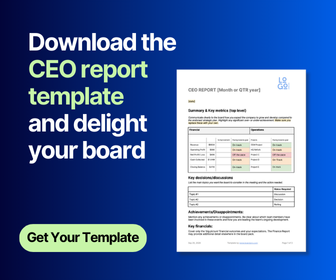Late reporting. The bane of all directors, and at times the demise of the CEO. Do any of these sound familiar?
- The board papers are sent out with little time for the Directors to digest
- The board committees meet an hour prior to the board meeting as it is convenient for the committee members
- Information contained in the board pack is so voluminous that directors are exhausted and STILL miss the important bits.
These situations are quite common; however there are even further scenarios that play out in the majority of boards that are more worrisome, yet seldom acknowledged.
This White Paper explores simple but incredibly effective strategies to dramatically enhance board reporting so that late reporting is a thing of the past.
Two types of late reporting
There are two types of late reporting that plague boards
- Annoying - Late reporting where the information goes out so late that it doesn’t allow directors quality time for analysis and insight. This results in frustration from directors as well as the senior executive. Because so much effort is put into the development of these reports by the senior executive, the reports are read at a superficial level by the board members, and then everyone complains the reports are too lengthy.
- Existential - Late reporting where trends/issues/whispers of the future/strategic implications are ignored - until too late. This can slowly destroy the organisation through lack of board focus and resultant declining relevance, until it ceases to exist in any impactful way.
Note: Many boards have both Type One and Type Two running rampant in their board reporting ecosystem. It has been reported that in Australia and the USA between 30% and even up to 50% of senior executive time is taken up with reporting to the board. If the volume of board reporting is focused and reduced, this not only helps the board do its job (of making the choices that create the future for the communities they serve) but can also significantly vary the cost of supporting a board.
Time to refocus the board and reinvigorate the CEO
The role of the board is “to make the choices that create the future for the communities we serve”. So the board needs to be focused on what choices they have, how these decisions are likely to create the future, and what impact this may have on their communities. When reading a board pack, the directors needs to be able to focus on the really important information that provides them with insight and is the springboard for strategic discussions at the board level. The directors should be looking for the top-level discussions they need to have as a board. They don’t want to be distracted by a lot of information that doesn’t address the “So what?” question.
The board and senior executive need to act as a true partnership, as the leadership team for the organisation, each with different responsibilities but with a built-in trust that is supported by ongoing evidence. This ongoing evidence is best represented in the reporting cycle. The reporting-cycle is more than just the timetabling of when reports need to be received, it is much richer than that. The reporting cycle needs to address all the elements below.
- Relevant – consider, align with and report on strategy. Using leading indicators (what might be) rather than a reliance on lagging indicators (what has been).
- Integrated – satisfy internal and external requirements and integrate the data from each level of the organisation so there is no duplication or extra effort to provide powerful board reports
- In perspective - review historical, current and projected scenarios
- Timely – imperfect information can be better than perfect information out of date
- Frequent – monthly reports focus on critical success factors, quarterly reports on qualitative aspects with broader coverage
- Reliable – directors require quality, trustworthy and unbiased information
- Comparable - enable easy comparison to agreed benchmarks, targets
- Clear - written in a clear and simple way
- From a Credible source
- Progress, not perfection
This reporting cycle should then provide a focus for the board reports to assist directors to answer the overarching board question … “So what?” (So what do you want us to focus on?, So what are the strategic implications?, So what are the questions we should be looking at?)
Techniques for different board reports
- Finances - In the profit and loss statements, add the heading “Strategic implications for discussion” at the bottom to highlight the strategic discussions the board needs to have that are informed by the reasons for variance. Finance committee to identify any potential strategic implications for the board to discuss. The reasons for variance from the P&L should be aligned with the relevant line item to make it easier for directors to match the dollar figures against the business drivers. Develop key ratios report to include the acceptable/non-acceptable ranges of these ratios and last year’s equivalent and analysis of reasons for variance, with the heading “Strategic implications for discussion” to highlight the strategic discussions the Board needs to have that are informed by Balance Sheet and other relevant ratios. Any dashboard reports should also have the heading “Strategic implications for discussion.”
- Risk – Recommend regular reports to board that focus on the agreed four or five key risks, how they are being managed, what else could be done to better manage, how to extract strategic advantage and where revenue streams might be possible.
- CEO’s report – Key heading here should be “What keeps me awake at night.” Writing an exceptional CEO report delivers the right content to the board, ensuring strategic conversations rather than operational.
- Operational and dashboard reports – if there are any strategic implications or questions that the author of the report would like the board to consider, extract this and add a specific briefing paper on this topic.
- Board to specify size and structure - of the board pack, providing staff with clear guidance e.g. no more than 80 pages; all items for discussion or decision to have a one or two pages of executive summary briefing paper, with supporting information linked to as required; all items that are optional reading are clearly marked as such to be linked and not put in the board pack.
Watch our recorded webinar on this topic.
If you are interested in learning more about Conscious Governance, check out the company’s website here. Learn more and connect with Steven Bowman here.
If you're looking for a tool to streamline your Board processes, check out BoardPro - an all-in-one software solution designed specifically for Boards and busy CEOs!
Schedule a demo with our team today and begin to experience a whole new way of meeting.
Share this
You May Also Like
These Related Stories

The importance of CEO reports in an organisation
%20(1).png)
What should a CEO report to the board?



